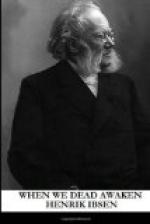MAIA.
Yes, I can. Oh, I know you so well, so well, Rubek.
PROFESSOR RUBEK.
Then perhaps you can also see who it is I am thinking of?
MAIA.
Yes, indeed I can.
PROFESSOR RUBEK.
Well? Have the goodness to—–?
MAIA.
You are thinking of that—that model you once used for— [Suddenly letting slip the train of thought.] Do you know, the people down at the hotel think she’s mad.
PROFESSOR RUBEK.
Indeed? And pray what do the people down at the hotel think of you and the bear-killer?
MAIA.
That has nothing to do with the matter. [Continuing the former train of thought.] But it was this pale lady you were thinking of.
PROFESSOR RUBEK.
[Calmly.] Precisely, of her.—When I had no more use for her—and when, besides, she went away from me—vanished without a word—–
MAIA.
Then you accepted me as a sort of makeshift, I suppose?
PROFESSOR RUBEK.
[More unfeelingly.] Something of the sort, to tell the truth, little Maia. For a year or a year and a half I had lived there lonely and brooding, and had put the last touch—the very last touch, to my work. “The Resurrection Day” went out over the world and brought me fame— and everything else that heart could desire. [With greater warmth.] But I no longer loved my own work. Men’s laurels and incense nauseated me, till I could have rushed away in despair and hidden myself in the depths of the woods. [Looking at her.] You, who are a thought-reader —can you guess what then occurred to me?
MAIA.
[Lightly.] Yes, it occurred to you to make portrait-busts of gentlemen and ladies.
PROFESSOR RUBEK.
[Nods.] To order, yes. With animals’ faces behind the masks. Those I threw in gratis—into the bargain, you understand. [Smiling.] But that was not precisely what I had in my mind.
MAIA.
What, then?
PROFESSOR RUBEK.
[Again serious.] It was this, that all the talk about the artist’s vocation and the artist’s mission, and so forth, began to strike me as being very empty, and hollow, and meaningless at bottom.




